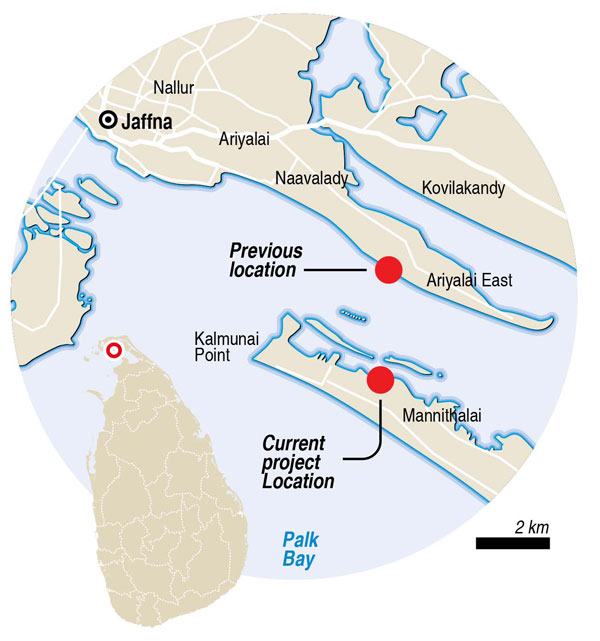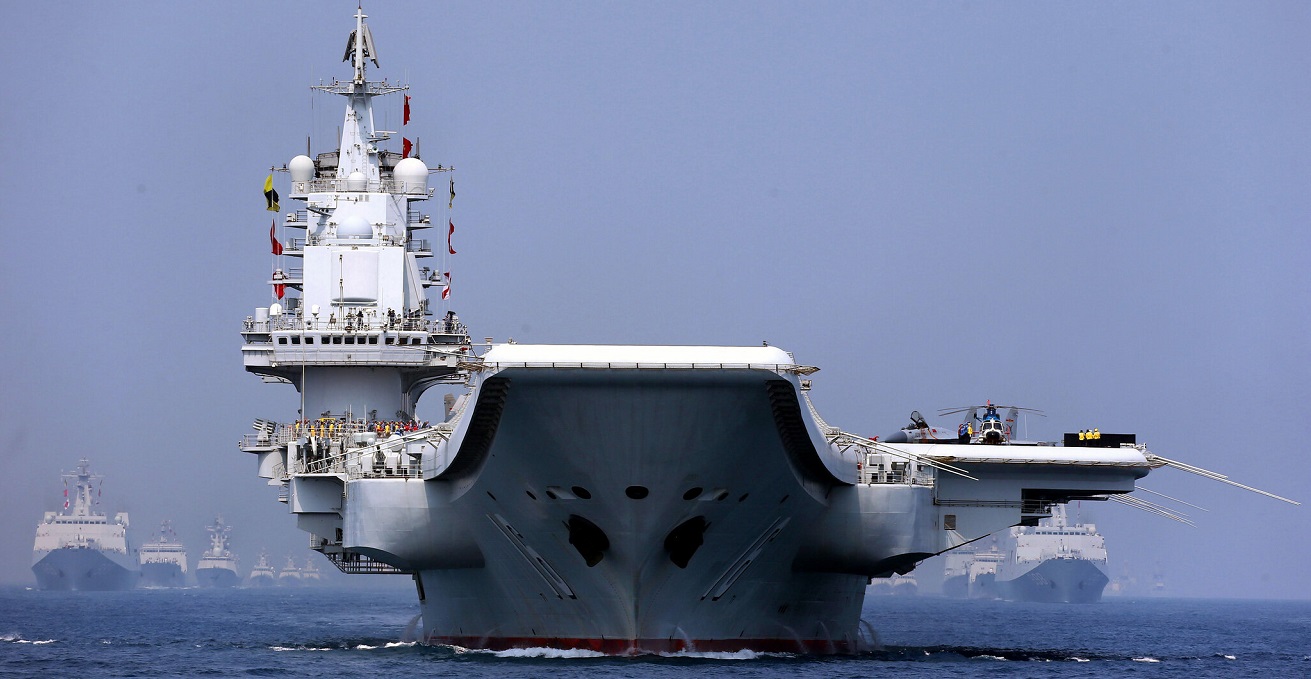Fishermen in dread.
China is the largest importer of northern Sri Lankan sea cucumber. A certain number of sea cucumber farmers are happy to receive top dollar. However, most northern fishermen, who traditionally rely on fishing for their livelihood, are in dire straits. They lament that their livelihood fishing industry is slowly disappearing. In Kiranchi village, Kilinochchi, the traditional fishermen’s protest against sea cucumber farms has crossed 100 days. In the northern peninsula, the farming method of caging a specific area in the sea and harvesting sea cucumbers is an unfamiliar experience. At this stage, the Centre for Strategic Studies – Trincomalee (CSST) engaged in inclusive discussions with Northern Fishermen Associations, environmentalists and civil society representatives and came across various eye-opening details.
Sea cucumber has been a part of the seafood business for over 50 years. For example, Sukanth International Pvt Ltd has been in the business for three generations – we have never opposed this, says Annalingam Annarasa, President of Jaffna District Fishermen’s Co-operative Society. However, after 2019, we oppose the mushrooming sea cucumber farm projects in Northern Province. These farms will prevent fish from coming to shore and fish reproduction. Besides, it is not our primary marine industry in the Jaffna peninsula. Sea cucumber harvest is for export only. They are trying to destroy the traditional fishing industry, which has been our livelihood for generations, Annarasa explained.
Mr A.M. Riaz Ahmed, a senior lecturer in the Department of Biological Sciences at the Southeastern University of Sri Lanka, told CSST, ‘the fears of the fishermen are justified. If large-scale seaweed harvesting is carried out alone, it will affect the food chain of marine resources and sea cucumber eggs and young larvae will become prey for fish and other marine animals, says Riaz. He recently published a book titled ‘Sea cucumber farming and the politics and ecology of seas of Jaffna Islands’.
Fishermen’s association representatives who have been fishing for three generations, all with one voice, say, “When we raise concerns that our traditional fisheries are being affected, they talk about foreign exchange.” We have known about the sea cucumber industry for over 50 years, but no one talked about foreign exchange back then. Earlier, it was available in small quantities and later shipped in bulk. Local companies like Sukanth did it in the 80s without harming the environment or affecting our livelihood. However, they now see farms as a way to get rich easily. People who have nothing to do with the marine industry (e.g. doctors and engineers) invest in it. They are not worried about the loss of livelihood of the fishermen due to their disconnection from the sea. They asserted that if 5000 sea cucumber hatchlings were collected and sent, they could become millionaires.
Sea cucumber is not consumed locally. What is the future of 5000 families who depend on fishing for their livelihood? The fishermen association explains that the shallow seas where seafood farms are set up are places we have traditionally used to catch shrimp, crab and clams. They have brought the sea under their control by sealing certain parts of the coastal areas. We cannot fish in that area—those who go to the area at night risk being arrested for theft.
Sea Cucumber farm owners are blinded by greed and don’t think of the future of the people of the north, especially poor fishermen. They also do not have any respect for nature and the motherland. The small-scale fishermen of Jaffna use the traditional wooden Vallam and Siraku (Winged) Valai method. Usually, these fishing nets are set at night and harvested the following day. These traditional fishing methods are eco-friendly, help sustain marine resources optimally, and are not exploited beyond recoupment.
However, another side is opposed to the views of fishermen’s associations and others who oppose sea cucumber farming in Jaffna. According to the people are disputing this rare opportunity to boost the local economy. This should not be seen from a political angle. Sea cucumber farms contribute a great deal to earning foreign exchange. As a result, the northern fishermen will be benefited. Many women benefit from this business. If people want to grow economically, they should expect changes. Slight damage may happen, and it is normal. The Chinese market is a golden opportunity, they justified.
However, the Jaffna district Fishermen Cooperative Association denies this. They pressed that only a few people of the representatives of the Fishermen’s Association expressed such a view. Those outside the fishing community say so. Initially, fishermen were advised and sometimes threatened to take over these sea cucumber farms. They were told outsiders would come, especially China if they did not take it. This is why some fishermen have to go into it. Jaffna district Fishermen Cooperative Association is the main organization comprising 108 fishermen associations in the Northern peninsula which has been firmly opposed to the sea cucumber farming method in Jaffna.
Chinese Entry:
In 2016, a Chinese company Gui Lan (Pvt) Ltd, established a hatchery in Ariyalai to produce sea cucumber chicks. In 2022, the Cabinet had identified about 5000 acres of coastal land in the Jaffna, Mannar, Kilinochchi and Batticaloa districts as suitable sites for sea cucumber projects.
While interviewing many representatives of fishermen associations, they are apprehensive about the sea cucumber farming method because of Chinese involvement as they do not have respect for local livelihood, traditions, culture, environment etc. Their common observation is that these farms are nothing compared to China’s investments and stature. According to the progress report of the Ministry of Fisheries-2021, Sri Lanka exported 326 metric tonnes of sea cucumber worth Rs 1.5 billion in 2020 to China, which is much less than the projected billion-dollar industry.
The sea cucumber trade in Jaffna has become an industry entirely dependent on China. That country’s influence cannot be avoided when hanging on a single country for exports. China’s influence on sea cucumber harvesting should be understood on this basis. Fishermen association also expresses doubts about the hatchery; many ascertain that the sea cucumber chicks are not artificially fertilized at the farms; in fact, they collect sea cucumber chicks in the sea and grow there.
They pointed out that all farmers relying on China for technology is endangerment. According to the Jaffna district Fishermen Cooperative Association, 400 sea cucumber farms have been established. The association says up to 5000 such farms will be set up. The association worries that many sea cucumber farms are set up illegally. They also claim that they only know a few farms’ real owners. A 100-acre farm was illegally established on Paruthi Island. It is a Chinese investment, but it is presented as a private farm. Most of the farms here are Chinese-invested, Association explained.
Those who speak from an ecological point of view also say that sea cucumber farms are not suitable for the northern peninsula. The Jaffna-based environmentalist Aingaranesan says that it is offshore monoculture farming. It may benefit certain investors and farm workers but eliminate local fisheries over time. It is harmful to the fisheries society and the entire northern community. The traditional fishermen are losing access to sea shore and sea, which are rich in resources and work as the breeding ground for fish. Further, they are losing jobs these farms offer as the farm owners are not engaging locals as labourers.
The Gulf of Mannar is considered a biologist’s paradise due to its rich biodiversity and ecosystem diversity. The Gulf of Mannar Biosphere Reserve is one of the world’s richest biodiversity hotspots between Pampan and Tuticorin. It was declared a Marine National Park in 1986 and then a Marine Biosphere Reserve in 1989. It is Southeast Asia’s first marine biosphere reserve.
According to a study by marine biologists, the sea cucumber plays a major role in marine biology. A team of researchers, including an expert from the California Academy of Sciences, says their study’s findings are an urgent call for increased fisheries management and protections for ecologically important sea cucumbers, sometimes called the “vacuum cleaners of the ocean,” worldwide. The study was recently published in the journal Conservation Genetics. However, such an organism is also a major trade in Southeast Asia. It is expensive seafood in China. It is also used for medical purposes.
Against this backdrop, the North-Sri Lankan Sea has now become the epicentre of the sea cucumbers trade that is completely banned in India. The maritime area between Sri Lanka and India is considered the most suitable place for gathering sea cucumber. This harvesting is illegal as per extant laws. According to international projections, these areas are currently identified as the hotspots for organized crime based on sea cucumber black business. According to media reports in 2019 – 2020, the Gulf of Mannar and Palk Bay has become a significant centre of organized crime related to the sea cucumber. Media reports suggest that smuggled sea cucumbers are being taken to the Hong Kong black market. Such black markets receive seafood from African countries where China has influence, and the end product goes to Hong Kong and China.
Strategic Concerns.
China’s increasing presence in maritime areas of India’s security concern cannot be looked at from a single dimension. The rosy picture of sea cucumber farms earning millions of FOREX for SL is only a blurred view of the foreign exchange earning industry. From a geopolitical perspective, its dimension is entirely different. Due to geographical proximity, India cannot turn a blind eye to any moves in the Palk Bay and Gulf of Mannar. While sea cucumber farms are amassed in the Northern sea areas, China’s presence is also significantly increasing in the North-Eastern provinces. The Chinese Embassy has recently increased its presence and activities in these areas.
The Chinese Embassy sought to assist the fishermen of the North and Eastern Provinces following the opposition to the sea cucumber farms among the traditional fishermen. The cabinet headed by Gotabaya Rajapaksa had given permission for a Chinese renewable power project at Nainathivu, Nedunthivu and Analaithivu, which are 50 kilometres from Tamil Nadu. This project was later abandoned. In this background, the Cabinet approved setting up large-scale sea cucumber farms in 2022. The proliferation of farms in the north points towards the fact that the Chinese are trying to gain ground on the pretext of Cucumber farms which they were unable to get under power projects, and that too at way cheaper prices.
China, the world’s second-largest economy, shows more interest in the small populace North-Eastern region of Sri Lanka, which is close to South India. Can it just be a matter of the sea cucumber? Sea cucumbers are used as food only in East Asian countries. Against this backdrop, China, the largest importer of sea cucumbers and neither India nor the West can interfere in this seafood trade, can very well utilise this trade for ulterior motives. When the local farm owners cannot carry on the business, the entire business will come under Chinese control. If the farms come under Chinese control, certain maritime areas will also indirectly come under Chinese hegemonic ambition, and no one can access and assess the activities undertaken by the Chinese.
Sea cucumber farming is a fair warning from the security point of view of the Indian subcontinent. Sea cucumber creatures have no eyes or brains. Strategic communities cannot function as sea cucumbers. The strategic community has already experienced how China has locked the Hambantota port into a 99-year lease. Brigadier General Robert Spalding’s book ‘Stealth War’ explains that ‘it is clear that China didn’t exactly help Sri Lanka improve its infrastructure — it swamped the country in debt and has now gained significant economic control over the struggling but strategically placed nation’.
Sea cucumber farming could be another strategic trap. It could be described as Chinese ‘sea trap’ diplomacy in the future.



